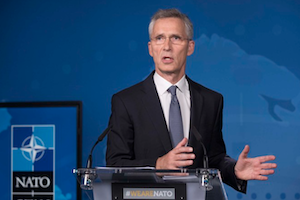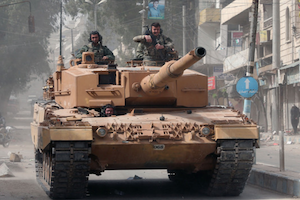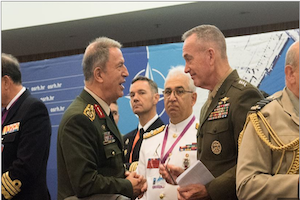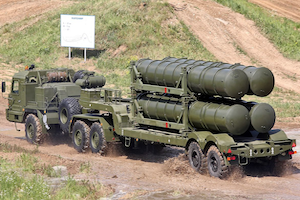Turkey's Libyan Intervention Heightens Franco-Turkish Systemic Rivalry
By Michaël Tanchum
June 23, 2020
On June 18, 2020, NATO Secretary-General Jens Stoltenberg announced the alliance is opening an investigation prompted by France's allegation that one of its naval frigates was targeted for attack by a Turkish naval warship in the Mediterranean as the frigate sought to interdict a civilian Turkish vessel suspected of transporting weapons to Libya. Although Turkey denies the allegation, the incident represents a new escalation in the rising tensions between Turkey and France already inflamed by France's increasing naval cooperation with Cyprus. Following the recent success of Turkey's military intervention to preserve Libya's Government of National Accord, Ankara reportedly plans to establish an air base and a naval base in the country. Reorienting the strategic architecture of the region more in Turkey's favor, the two Libyan bases will greatly boost Turkey's engagement with the nations of North Africa and the Sahel. Facing a potential loss of influence in Africa, France may choose to align more deeply with Turkey's rivals in Libya.

Turkey's In-between State of War and Peace with Russia
By Michaël Tanchum
March 25, 2020
On March 15, 2020, Turkey and Russia conducted their first joint patrol along the M-4 highway in Syria's Idlib province, implementing the terms a ceasefire accord that ended the direct military confrontation between Turkey and Russia. Ankara will prioritize avoiding further confrontation and cooperate with Moscow in order to consolidate Turkey's position in northern Syria. The degree to which Moscow reciprocates Turkey's gestures in Idlib will be the measure of how much Moscow is able and willing to accommodate Turkey's interests in northern Syria.

A Dangerous Policy of Turkish Containment in the Eastern Mediterranean
By Micha’el Tanchum
July 3, 2019
Turkey's provocative action of sending two drillships into Cypriot waters to explore for natural gas is a response to a grander provocation coming from the Republic of Cyprus, Greece, Egypt, and Israel to exclude Turkey from the marketing of Eastern Mediterranean gas. This common front, composed of interlinked security partnerships among the region's current natural gas producers and Greece, has been increasingly supported by the United States, France, and Italy, each of whom has significant economic investments in Eastern Mediterranean gas. For Ankara, its NATO allies' support of this common front is tantamount to a policy of soft containment against Turkey. The hardening of this containment through substantial naval support to the Republic of Cyprus as a response to Turkey's actions could send the Eastern Mediterranean into a dangerous escalation spiral that could permanently alter Turkey's relationship with NATO.

Turkey's Purchase and the Path to a Post-American Alliance Architecture
By Micha’el Tanchum
April 22, 2019
Turkey's taking delivery of the Russian S-400 air and missile defense system in July 2019 is a momentous strategic step. It reflects the realignment of Ankara's interests away from Washington and toward Moscow. Washington's planned punitive measures could precipitate Turkey’s exit from the NATO alliance. Unless concessions are forthcoming from the U.S. to induce Turkey to reciprocate by finding a face-saving way out of installing the S-400 system, a strategic divorce may not be averted.

Turkey is Expecting a Restart with the U.S.
By Halil Karaveli
January 23, 2017
The Kurdish question has, once again, complicated Turkish-American relations. The rhetoric of anti-Americanism remains useful to whip up and mobilize nationalist opinion. Yet, Erdoğan’s Islamists are not any aspiring anti-imperialists. What they want – and what they expect that Turkey is now going to get – is simply a better “business deal” with the United States under Donald Trump.



